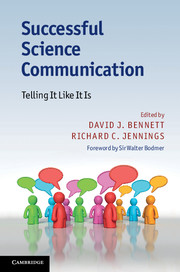Book contents
- Frontmatter
- Contents
- Foreword
- Authors' biographies
- Introduction Public engagement in an evolving science policy landscape
- Part I What it helps to know beforehand
- 1 Deficits and dialogues: science communication and the public understanding of science in the UK
- 2 Explaining the world: communicating science through the ages
- 3 Science: truth and ethics
- 4 The public's view of science
- 5 The common language of research
- 6 Not 100% sure? The ‘public’ understanding of risk
- 7 The ethos of science vs. ethics of science communication: on deficit and surplus models of science–society interaction
- Part II Policy-makers, the media and public interest organisations
- Part III What you can do and how to do it
- Part IV And finally, evaluating and embedding science communication
- Index
- Plate section
- References
2 - Explaining the world: communicating science through the ages
Published online by Cambridge University Press: 05 May 2013
- Frontmatter
- Contents
- Foreword
- Authors' biographies
- Introduction Public engagement in an evolving science policy landscape
- Part I What it helps to know beforehand
- 1 Deficits and dialogues: science communication and the public understanding of science in the UK
- 2 Explaining the world: communicating science through the ages
- 3 Science: truth and ethics
- 4 The public's view of science
- 5 The common language of research
- 6 Not 100% sure? The ‘public’ understanding of risk
- 7 The ethos of science vs. ethics of science communication: on deficit and surplus models of science–society interaction
- Part II Policy-makers, the media and public interest organisations
- Part III What you can do and how to do it
- Part IV And finally, evaluating and embedding science communication
- Index
- Plate section
- References
Summary
The history of science communication is the story of how scientific practitioners have attempted both to educate the public and to project a positive image of themselves. They have especially sought to justify their activities in terms of what the public think to be useful or interesting.
Science as status: the Ancient Greeks
Nobody knows how the earliest Greek philosophers told the public about their ideas. Legend portrays them as disinterested sages thinking great thoughts without a care in the world. Thales of Miletus (c. 620 BC– c. 546 BC) supposedly fell down a hole because he had been looking up at the stars. But it seems likely that they valued the status that philosophy bestowed on them and actively tried to enhance it by disseminating their theories.
- Type
- Chapter
- Information
- Successful Science CommunicationTelling It Like It Is, pp. 31 - 44Publisher: Cambridge University PressPrint publication year: 2011
References
- 2
- Cited by



